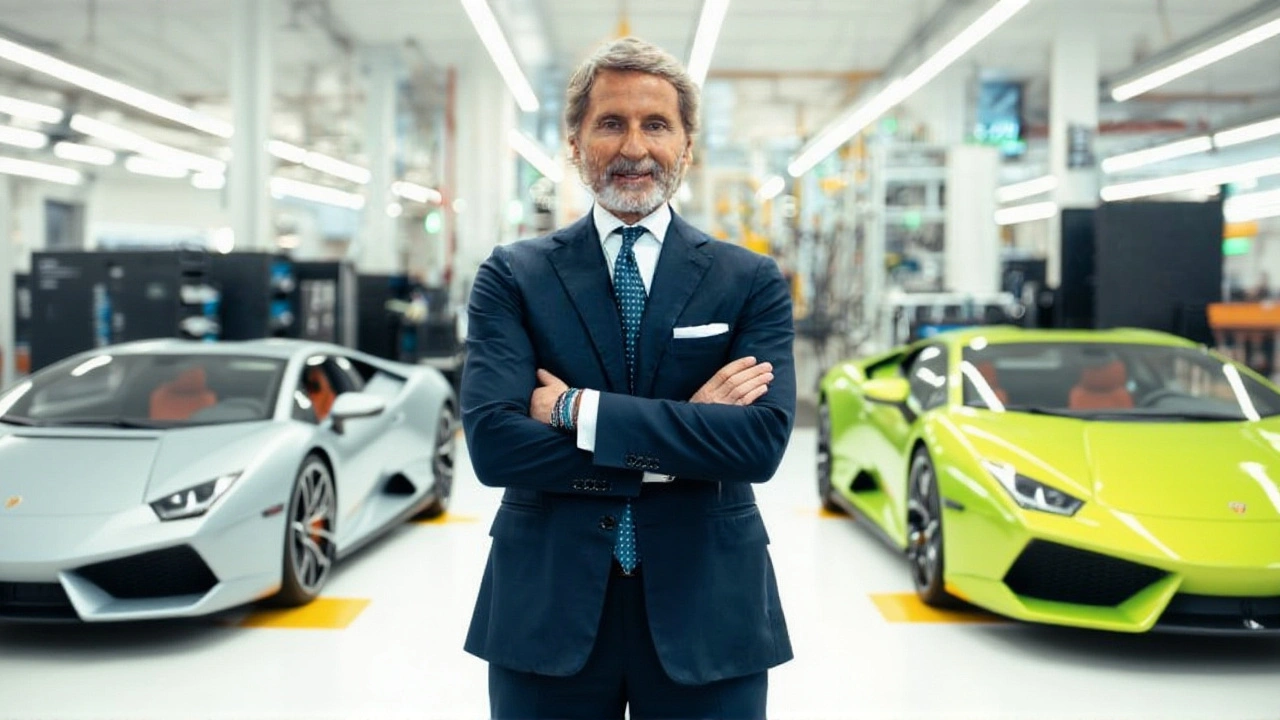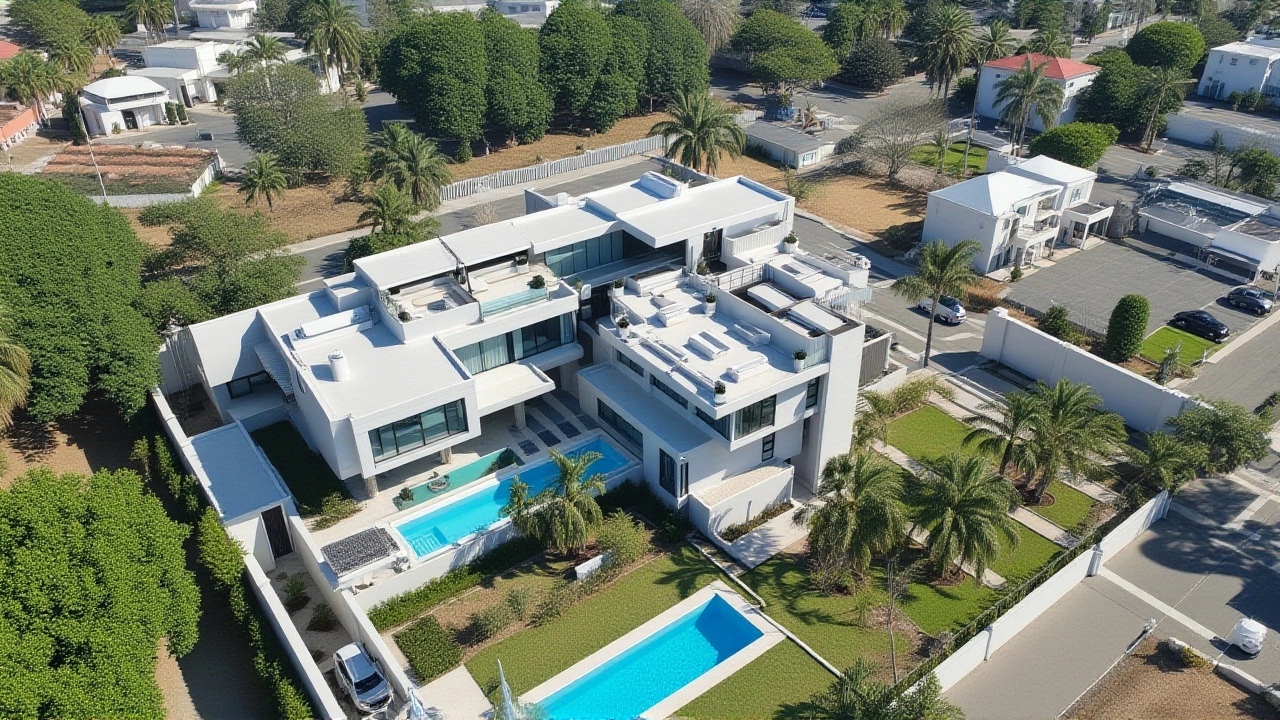When Stefano Domenicali, CEO of Automobili Lamborghini S.p.A., walked onto the ceremonial platform at the company’s home base on 8 October 2025, the air crackled with the kind of anticipation usually reserved for a new supercar launch. The venue? Sant'Agata Bolognese, the tiny Emilia‑Romagna town that has birthed every Lamborghini ever built. Instead of a roaring engine, however, the headline was a silent, gleaming sculpture – the brand‑new Manifesto Concept – presented as the next visual bible for the marque.
Background: Lamborghini’s design evolution
Lamborghini has never been shy about using concept cars as design signposts. In 2017 the electric‑driven Terzo Millennio turned heads not just for its battery tech but for the angular, futuristic silhouette that later seeped into the production‑ready Revuelto and even the more conventional Temerario. That strategy – showcase a bold study, then let its DNA trickle down – set the stage for this year’s reveal.
Industry analysts often trace the brand’s visual language back to the aggressive “sharp‑edge” philosophy introduced with the Miura and refined through the Murciélago. Each generation added a new signature: the scissor doors, the low‑slung nose, the distinctive “Y‑shaped” headlamps that first appeared on the Aventador. The Manifesto Concept is positioned as the next chapter, a synthesis of heritage and a radical new purity.
Manifesto Concept world premiere
The event itself was coded as an Lamborghini Manifesto Concept World PremiereSant'Agata Bolognese Headquarters. No auto show, no press tents – just the glossy white walls of Lamborghini’s design studio, a handful of engineers, and a live stream that was later picked up by the YouTube channel YOUCAR. The video, posted at 14:32 GMT, runs a crisp 1 minute 33 seconds and opens with the line, “The clearest expression of the new Lamborghini vision is Manifesto.”
In the official press release, Lamborghini’s spokesperson said, “Every surface, angle and proportion is sculpted to evoke immediate emotion, merging the essential with the iconic. Manifesto is a declaration of intent, created to guide the language of the brand in the years ahead.” The wording echoes the marque’s long‑standing habit of framing design as emotional storytelling rather than pure engineering.
Key design cues: Y‑shaped lights and hexagonal motifs
While the car itself remains a static study – no drivetrain, no performance figures – the visual cues are unmistakable. The most striking are the newly refined Y‑shaped headlamps, now flanked by a subtle hexagonal lattice that runs across the front bumper and continues onto the side skirts. According to the release, these patterns “reaffirm the marque’s DNA while introducing innovations that will influence tomorrow’s cars.”
Inside, the cabin silhouette follows the same logic: a cockpit that feels both cramped and purposeful, with a central digital cluster that mirrors the exterior’s geometric rhythm. Even the wheel arches, traditionally muscular, have been softened into sweeping, sculptural folds that catch light in a way Lamborghini describes as “radical purity.”
Industry reaction and expert take
Top Gear, operating under BBC Studios, ran a quick piece titled “Surprise! This is the new Lamborghini Manifesto concept,” noting that the “Y‑shaped lights and hexagonal patterns” could become the brand’s next visual shorthand. The article quoted a senior automotive analyst, Emma Walker, who observed, “Lamborghini isn’t just tweaking an existing motif; they’re building an entire design language that could span the next decade.”
Netcarshow.com echoed the sentiment, calling the car a “sculpture on four wheels” that “distils Lamborghini design into a philosophy of radical purity and powerful presence.” The consensus among journalists is clear: the Manifesto Concept is less about a single model and more about a stylistic roadmap that will shape everything from hypercars to entry‑level supercars.

What’s next for Lamborghini’s lineup
Although the company withheld any production timetable, the internal roadmap hinted at a rollout beginning in 2026. Engineers are reportedly already testing the new lighting architecture on prototype versions of the upcoming Huracán refresh, while the hexagonal surface treatments are slated for the next generation Aventador successor. If history is any guide, expect the first production vehicle bearing Manifesto DNA to appear on showroom floors by late 2027.
Beyond aesthetics, Lamborghini’s focus on “lasting impact” suggests a deeper brand strategy: positioning each new model as a cultural artefact, not merely a performance machine. In an interview with YOUCAR, the design chief – whose name remains undisclosed – hinted that the concept’s “emotional statement” could translate into a more immersive ownership experience, perhaps through bespoke interior finishes and augmented‑reality driver interfaces.
Historical context: From Terzo Millennio to the future
To appreciate Manifesto’s significance, look back at the 2017 unveiling of the Terzo Millennio. That electric prototype was a bold experiment in carbon‑fiber‑reinforced twin‑motor architecture, yet its most lasting legacy was the angular front fascia that resurfaced on the 2020 Revuelto. The pattern repeats: a concept car arrives, sets a visual tone, and a few years later the language becomes mainstream. Manifesto appears poised to be the same catalyst, only this time Lamborghini is betting on a holistic visual grammar that will inform everything from badge design to wheel rim geometry.
In the end, the Manifesto Concept is less a car you can drive and more a manifesto you can see. It tells fans, investors, and rivals that Lamborghini’s future will be built on a foundation of bold geometry, emotional immediacy, and an unwavering nod to its storied past.
Frequently Asked Questions
What makes the Manifesto Concept different from previous Lamborghini concepts?
Unlike the technology‑heavy Terzo Millennio, Manifesto is a pure design study. It strips away powertrain details to focus on shape, light, and surface treatment, establishing a new visual language that will be applied across future production models.
When can we expect to see the Manifesto design cues on a road‑legal Lamborghini?
Lamborghini insiders say the first production car featuring Manifesto’s Y‑shaped headlights and hexagonal motifs could debut in late 2027, with design integration beginning on prototype models as early as 2026.
Why did Lamborghini choose to reveal the concept at its Sant'Agata Bolognese headquarters instead of a major auto show?
The brand wants to keep the focus on design rather than spectacle. An internal unveiling lets engineers control the narrative, ensures the concept remains a pure statement, and continues Lamborghini’s tradition of using exclusive events for pivotal design announcements.
How does the Manifesto Concept reflect Lamborghini’s broader brand strategy?
By positioning the concept as a “sculpture on four wheels,” Lamborghini signals a shift toward treating each model as an emotional and cultural artefact. This aligns with their push for deeper owner experiences and a stronger, instantly recognisable visual identity.
Will the Manifesto Concept influence Lamborghini’s electric‑vehicle roadmap?
While the concept itself is not a powertrain showcase, the emphasis on futuristic aesthetics suggests that upcoming electric or hybrid models will adopt its design language, blending cutting‑edge tech with the new visual cues.



Roushan Verma
October 10, 2025 AT 04:28The Manifesto Concept showcases a fresh visual language that could shape Lamborghini’s future models.
Shailendra Thakur
October 20, 2025 AT 04:28Lamborghini’s heritage is rooted in bold Italian engineering, not fleeting design trends. The new Y‑shaped lights feel like a superficial tweak rather than a true evolution. While the hexagonal motifs look modern, they risk diluting the brand’s iconic aggression. India’s own automotive ambitions show that substance must back style. Ultimately, design without performance is an empty promise.
Raksha Bhutada
October 30, 2025 AT 03:28The Manifesto Concept is more than a static sculpture; it is a manifesto in steel and carbon fiber that declares Lamborghini’s intent for the next decade. Its angular silhouette borrows from the Terzo Millennio but refines the language into something that feels both timeless and futuristic. The Y‑shaped headlamps, now sharper, act as a visual beacon that will instantly identify the brand on any road. Hexagonal lattice patterns across the bumper echo the geometry of high‑performance circuitry, hinting at an electronic future without shouting about it. Inside, the cockpit’s digital cluster mirrors the exterior’s motifs, creating a cohesive rhythm that pleases the eye.
Historically, Lamborghini has used concept cars as design signposts, and this is no exception; the Manifesto is the newest signpost pointing toward 2027‑2028 production models. The softened wheel arches are a subtle nod to aerodynamics, showing that even the most muscular parts can be sculpted for efficiency. By stripping away drivetrain details, the designers forced the audience to focus purely on form, which is a daring move in an industry obsessed with power figures.
Industry analysts have already noted that the hexagonal surface treatments may appear on the next Aventador successor, suggesting a trickle‑down effect already in motion. The use of radical purity as a design philosophy aligns with Lamborghini’s brand narrative of emotional immediacy. This approach could also translate to bespoke interior finishes, giving owners a more personalized experience.
From a strategic standpoint, unveiling the concept at the headquarters rather than a major auto show keeps the spotlight on design purity rather than spectacle. It also reinforces the idea that Lamborghini sees itself as a cultural artefact creator, not just a car manufacturer. The timing of the reveal, just before the holiday buying season, positions the brand to capture attention ahead of potential 2026 prototype testing.
In conclusion, the Manifesto Concept serves as a visual bible that will likely guide everything from badge design to wheel rim geometry for years to come. Its influence will be felt across the lineup, from a refreshed Huracán to the eventual successor of the Aventador. Fans should watch for the first production model bearing these cues in late 2027, when the design language finally moves from concept to concrete reality.
Samradh Hegde
November 9, 2025 AT 03:28The new Y‑shaped lights look sharp and fit the brand’s aggressive image. The hexagonal motifs add a modern touch without overwhelming the classic lines.
Shankar Pandey
November 19, 2025 AT 03:28Life is a curve and the road a canvas where man paints his ambition the same way Lamborghini paints steel and carbon some think its just a pretty picture but every line tells a story the Manifesto whispers of future battles it hints at power even if it hides the engine beneath a veil of aesthetics i guess we cant always see the roar but we can feel the echo in the design though maybe its too much hype just a concept a fleeting dream but dreams shape reality eventually they become roads we drive on
Pratap Chaudhary
November 29, 2025 AT 03:28I see the point about the Y‑shaped lights being a bit of a shallow tweak, but the overall proportion feels like a natural evolution of Lamborghini’s DNA.
Smita Paul
December 9, 2025 AT 03:28Actually, the hexagonal lattice might improve airflow around the front splitter, which could benefit cooling on future hybrid models. Also, the interior digital cluster’s geometry could streamline driver interaction, reducing distraction.
Shruti Phanse
December 19, 2025 AT 03:28From a broader perspective, the Manifesto Concept embodies a strategic shift toward a unified visual identity that transcends individual model cycles, thereby strengthening brand equity across global markets.
Shreyas Moolya
December 29, 2025 AT 03:28While the design is sleek it feels a bit too polished for the raw heritage that defines the marque
Pallavi Gadekar
January 8, 2026 AT 03:28Awesome look! Can’t wait to see these cues on the next Huracán – it’ll be super exciting!